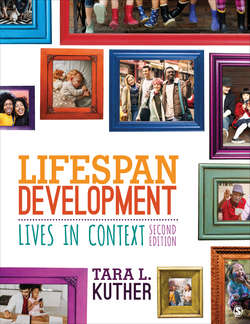Читать книгу Lifespan Development - Tara L. Kuther - Страница 365
На сайте Литреса книга снята с продажи.
Vygotsky’s Sociocultural Theory
ОглавлениеRussian psychologist Lev Vygotsky emphasized the influence of culture on children’s thinking. Specifically, he proposed that cognitive development is influenced by differences in the ways particular cultures and societies approach problems. Vygotsky’s sociocultural perspective asserts that we are embedded in a context that shapes how we think and who we become. Much of children’s learning comes not from working alone but from collaborating with others.
Children learn culturally valued skills by interacting with and helping skilled partners.
John Scofield/ Contributor via Getty Images
Specifically, Vygotsky argues that mental activity is influenced by culture, specifically, cultural tools that are shared by members of a culture (Robbins, 2005; Vygotsky, 1978). Cultural tools include physical items such as computers, pencils, and paper but also ways of thinking about phenomena, including how to approach math and scientific problems. Spoken language is a vital cultural tool of thought. Children learn how to use the tools of their culture by interacting with skilled partners who provide guidance. For example, suppose a child wanted to bake cookies for the first time. Rather than send the child into the kitchen alone, we would probably accompany the child and provide the tools needed to accomplish the task, such as the ingredients, a rolling pin to roll the dough, cookie cutters, and a baking sheet. We would probably show the child how to use each tool, such as how to roll out the dough, and watch as he or she does it, scaffolding his or her learning. With interaction and experience, the child adopts and internalizes the tools and knowledge, becoming able to apply it independently. Both the learner and teacher contribute mutually (Rogoff, 2015). Vygotsky argued that in this way, culturally valued ways of thinking and problem solving get passed on to children.
